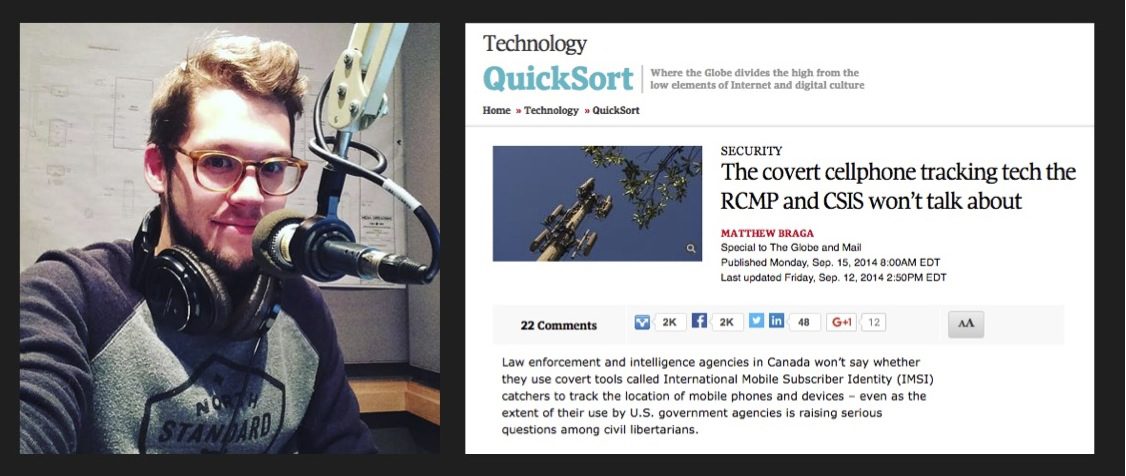By Chelsea Lau
For Matthew Braga, technology was just an interest at first. He wanted to know the inner workings of technology and how they worked on a technical level, whether it was smart phones, laptops or video games. It was only when he pursued writing that he combined his love of tech with journalism and explaining those inner workings became his career.
Now, Braga is a freelance tech reporter and a lecturer at Ryerson University. Earlier this year he made the switch from editing—he was the Canadian editor of Vice tech vertical Motherboard—to freelancing. For instance, in June, he explored how encryption software works to keep cyber criminals from using our personal data for the Walrus. And earlier this year he looked at how cellphone-surveillance used by Canadian police departments works for the Globe and Mail.
Braga has tips for finding and covering any tech scoop.
Finding New Angles
“You have to be a little more of a chameleon when you’re doing freelance,” he said.
Braga has done a fair share of financial, culture and science beat reporting, and he says a lot topics tend to cross over with tech.
“You’ve got aspects of business reporting coming in, and financial reporting and political reporting and labor reporting and all that,” said Braga. “The niche thing that I’ve tried to do is try to think about technology in ways that are a little bit more off the beaten path.”
He recently wrote a story for Bloomberg about undersea drones called remotely operated vehicles, or ROVs, and the effect the oil downturn has had on their use.
“Being freelance changes the way I think about the types of stories that I cover and what I’m covering as well,” said Braga.
Knowing the Audience
Every publication has a different focus and knowing it is half the battle when pitching stories. As well, the audience’s knowledge changes the angle and way an article is written, according to Braga. For example, when writing about police surveillance technology for general publications like CBC and the Globe and Mail, Braga said the information had to be really broken down.
In contrast, at Motherboard he could have written more about the manufacturers and how the devices operate on a technical level.
“There’s a certain expectation that your audience is pretty plugged in and pretty tech savvy,” said Braga of Motherboard’s audience. He added that technology news sites have more in depth articles than publications with a general audience, where a technical story might seem bogged down.
“Ultimately I want to strike that nice balance between writing to a tech savvy audience, but also being accessible
Covering Big Companies
Braga said that since the Apples and Microsofts of the world have become so big there are few opportunities to get a peek behind the scenes. “There’s sorts of stories that as a freelancer you’re probably not going to be able to do and not going to be able to pitch,” said Braga—but, he noted, you have to be able to report on these companies “in a way that isn’t just re-writing press releases.”
The reporters on big technology company beats have spent years building contacts and a rapport with those companies that gives them an advantage that newer reporters don’t have, he noted.
“As a freelancer I think the challenge is that you kind of have a sense of what the big publications are going to cover,” said Braga, adding that you can still report on these companies by finding a unique angle.
Maintaining Sources
“The sources that have stuck with me are people that are receptive to you checking in on them every few months,” said Braga.
Braga said that one of the ways he generates stories as a freelance writer is by talking to his contacts. With freelancing, there is more time to research and think about stories. You can also think about the big picture and get the opinions of your sources to see if a story is worth pursuing. “It helps when you kind of have beats and areas of interest,” he said.
Interviewing
Braga said that although it’s difficult to admit when you don’t know something, getting explanations from experts will help you convey a story better. “I think when you’re interviewing people there’s no harm in saying that you don’t understand something,” he said.
“Do your research, but obviously no one expects you to be an expert,” he said.
“Whenever you’re interviewing someone get them to really break it down or dumb it down,” said Braga. Even if you do know about a topic, using a quote is better than explaining it yourself, he explained
The world of technology is changing every day, as are the ways to write about it. But just because the concepts are complex doesn’t mean your stories have to be.
Clarification, Oct. 13, 2016: Braga was the Canadian editor of Motherboard.
Chelsea Lau is a 2016 graduate of the journalism program at Algonquin college. She has worked as layout editor for the Algonquin Times and design editor for Glue Magazine.

